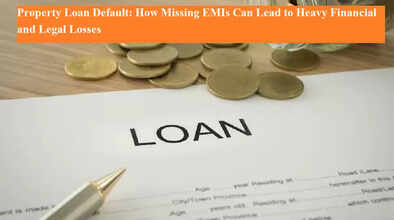Property Loan Default: How Missing EMIs Can Lead to Heavy Financial and Legal Losses

Taking a loan against property can be a convenient way to raise large funds, but failing to repay it on time can have serious financial and legal consequences. Defaulting on loan repayments not only attracts penalties but can also put your valuable assets, including your home, at risk. Understanding how banks and financial institutions handle defaults can help borrowers avoid long-term damage.
What Counts as a Default
A default occurs when you fail to pay your loan EMI on or before the due date. Missing one or two EMIs usually leads to late payment charges or penalties. However, repeated defaults trigger stricter action. If EMIs remain unpaid for 90 days or more, the loan account is classified as a Non-Performing Asset (NPA). This classification gives banks and Non-Banking Financial Companies (NBFCs) the legal right to start recovery proceedings.
Impact on Your Credit Score
The first visible impact of a default is on your credit score. Every missed EMI is reported to credit bureaus such as CIBIL and Experian, lowering your credit rating. A poor credit score makes it harder to get future loans, including personal loans, car loans, or even new credit cards. Even if a lender agrees to extend credit, they may charge a much higher interest rate to compensate for the perceived risk.
Banks’ Legal Recovery Rights
Loans against property are secured loans, which means banks have legal rights over the collateral. Under the SARFAESI Act, lenders can issue a recovery notice if the default remains unresolved for 60 days after classification as an NPA. If payment is not made within this period, the bank can take possession of the property and auction it to recover the outstanding dues. This process allows banks to reclaim their money without lengthy court procedures.
Risk of Losing Your Home
If the property pledged is your residential home, the risk is even greater. Banks can ask you to vacate the house and proceed with the auction if the loan remains unpaid. Losing a home carries not only a financial cost but also deep emotional distress, as it often represents years of personal attachment and family memories. This is why many people hesitate to mortgage the house they live in, despite the lower interest rates offered on property loans.
Possible Support from Lenders
Not all defaults lead directly to property seizure. Banks and NBFCs understand that borrowers may face unexpected hardships—such as job loss, illness, or natural disasters—that are beyond their control. In such cases, lenders often offer loan restructuring options. This may include extending the repayment tenure or reducing the EMI amount, making it easier for borrowers to get back on track. Loans restructured under such agreements are generally not classified as NPAs if the borrower adheres to the revised schedule.
Key Takeaways for Borrowers
-
Always pay EMIs on time to avoid penalties and credit score damage.
-
Communicate with your lender at the first sign of financial difficulty.
-
Explore restructuring options if you face genuine repayment challenges.
-
Avoid mortgaging your primary residence unless absolutely necessary.
A loan against property can be a powerful financial tool when managed responsibly. But failure to repay on time can result in legal action, property loss, and long-term financial strain. Staying proactive and maintaining clear communication with your lender is the best way to protect both your credit profile and your assets.

